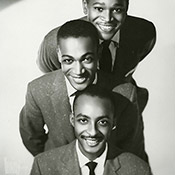Charles Walton Papers
Finding Aid: Charles Walton Papers
Repository:
Chicago Public Library, Carter G. Woodson Regional Library, Vivian G. Harsh Research Collection of Afro-American History and Literature
 Charles Walton PapersCharles Walton was a jazz drummer, music educator, and
author of “Bronzeville Conversations,” a research and oral history
project that documented the jazz and blues world in Black
Chicago. Born in 1925 in Selma, Alabama, Walton moved to
Chicago’s South Side as a child. He become a jazz drummer immediately
after World War II and went on to direct music education at Malcolm X
College. He also served as an officer in the American Federation of
Musicians Local 10-208. Walton worked tirelessly on a project to
document Chicago’s Black music history, conducting oral histories with
over 170 musicians, club owners, politicians, promoters, and producers
involved in Bronzeville jazz and blues.
Charles Walton PapersCharles Walton was a jazz drummer, music educator, and
author of “Bronzeville Conversations,” a research and oral history
project that documented the jazz and blues world in Black
Chicago. Born in 1925 in Selma, Alabama, Walton moved to
Chicago’s South Side as a child. He become a jazz drummer immediately
after World War II and went on to direct music education at Malcolm X
College. He also served as an officer in the American Federation of
Musicians Local 10-208. Walton worked tirelessly on a project to
document Chicago’s Black music history, conducting oral histories with
over 170 musicians, club owners, politicians, promoters, and producers
involved in Bronzeville jazz and blues.
The Charles Walton Papers at the Chicago Public Library, Carter G. Woodson Regional Library, Vivian G. Harsh Research Collection of Afro-American History and Literature include drafts of his unfinished book, over 300 oral history interviews with 179 subjects, essays from “Bronzeville Conversations,” as well as rare documents and photographs.




